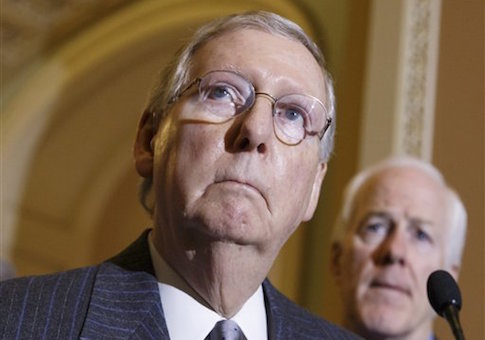Republican leaders are voicing concerns over legislation that allows family members of Sept. 11 victims to sue Saudi Arabia over its alleged role in the attacks just one day after Congress overwhelmingly rejected President Obama’s veto of the bill.
Senate Majority Leader Mitch McConnell (R., Ky.) opened the door to altering the legislation, telling reporters on Thursday the measure is "worth further discussions," the Hill reported. House Speaker Paul Ryan (R., Wis.) agreed legislators may have to "fix" the bill, though he did not detail when such tweaks would occur.
"We want to make sure the 9/11 victims and their families had their day in court," Ryan told reporters. "At the same time, I would like to think that there may be some work to be done to protect our service members overseas from any kind of legal ensnarements that occur, any kind of retribution."
The measure, known as the Justice Against Sponsors of Terrorism Act, became law on Wednesday after both houses of Congress overwhelmingly voted to override a White House veto for the first time in Obama’s presidency.
Lawmakers on both sides of the aisle, along with a number of 9/11 families, believe Saudi Arabia had a hand in the Sept. 11 attacks given that 15 of the 19 terrorists who participated were Saudi. Saudi Arabia has denied involvement in the attacks, and Riyadh has never been formally implicated.
White House spokesman Josh Earnest said it was an "abject embarrassment" that lawmakers are already considering alterations to the legislation. He said the recent reservations about the measure show a Congress undergoing a "rapid-onset of buyer’s remorse."
"There’s a desire to amend what occurred yesterday to put us in a better place," Sen. Bob Corker (R., Tenn.), who chairs the Senate Foreign Relations Committee, told reporters.
Sen. Lindsey Graham (R., S.C.) said Wednesday the Senate would likely revise changes to the bill as early as the lame-duck session, which begins after the November election. Graham said he wants to heighten the threshold for a defendant to be able pursue a lawsuit against a foreign government.
The White House has said the bill would endanger Americans abroad, including military personnel, who could potentially be harmed from foreign lawsuits brought against them because of U.S. government actions. Critics of the bill have also argued it could hurt relations with Saudi Arabia, a longtime U.S. ally.
